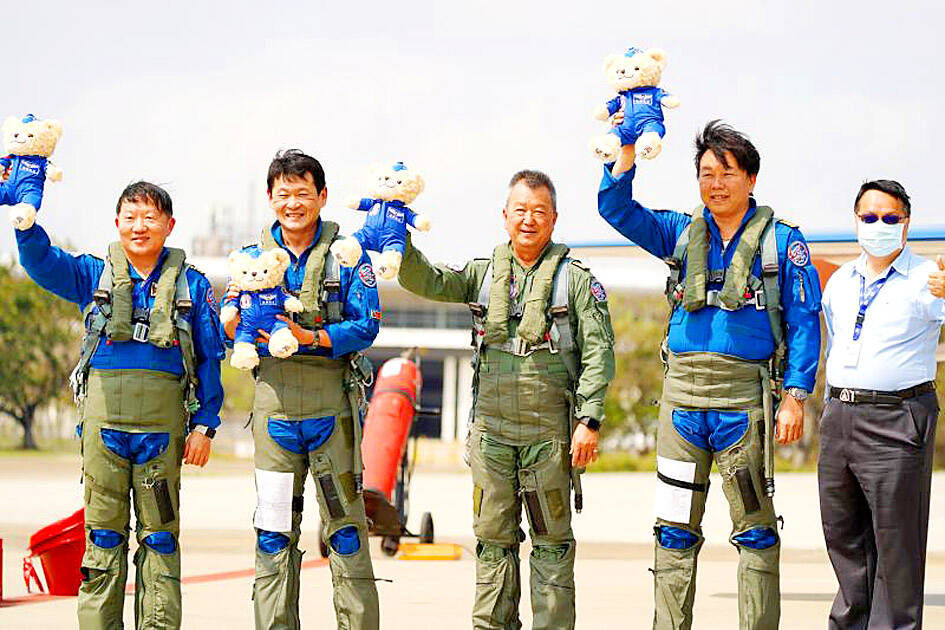Taiwan is seeking US cooperation to make its next domestically developed fighter jet, the head of Taichung-based defense contractor Aerospace Industrial Development Corp (AIDC) said yesterday.
Taiwan’s air force scrambles daily to see off incursions by Chinese jets into airspace near the country, as Beijing steps up pressure on Taipei.
While the mainstay of the air force is Lockheed Martin Corp’s F-16s and French-built Mirages, it also uses AIDC’s F-CK-1 Ching-kuo Indigenous Defense Fighter (IDF).

Photo: Aaron Tu, Taipei Times
The IDF fleet was rolled out more than three decades ago, but has been upgraded.
Speaking at a Taiwan-US defense industry forum in Taipei, AIDC chairman Hu Kai-hung (胡開宏) said the company wanted to raise its technical prowess to help with the development of Taiwan’s next-generation fighter.
“When it comes to the development of the next-generation fighter, we hope the United States supports Taiwan to develop it itself, including the engine, avionics, control systems, environmental controls and so on, which are all an opportunity for Taiwan-US cooperation,” he said.
Taiwan in 2017 announced the next-generation fighter program, to include stealth capabilities, but has given few details since.
Most countries are hesitant to sell weapons to Taiwan for fear of angering China.
Even the US has been unwilling to provide Taiwan its most advanced fighters, such as the F-22 or F-35, and Taiwan has no direct answer to China’s new J-20 stealth fighter.
This has driven Taiwan to develop a new home-built fighter as part of an overall strategy to make more weaponry itself, such as submarines.
“Domestically made aircraft is the road we have to travel,” he said.
AIDC in 2020 test flew a new jet trainer, the AT-5 Brave Eagle, Taiwan’s first jet made domestically since the IDF, and the company is also upgrading the F-16 fleet to the more advanced F-16V version and operates an F-16 maintenance facility.

Taiwanese can file complaints with the Tourism Administration to report travel agencies if their activities caused termination of a person’s citizenship, Mainland Affairs Council Minister Chiu Chui-cheng (邱垂正) said yesterday, after a podcaster highlighted a case in which a person’s citizenship was canceled for receiving a single-use Chinese passport to enter Russia. The council is aware of incidents in which people who signed up through Chinese travel agencies for tours of Russia were told they could obtain Russian visas and fast-track border clearance, Chiu told reporters on the sidelines of an event in Taipei. However, the travel agencies actually applied

Japanese footwear brand Onitsuka Tiger today issued a public apology and said it has suspended an employee amid allegations that the staff member discriminated against a Vietnamese customer at its Taipei 101 store. Posting on the social media platform Threads yesterday, a user said that an employee at the store said that “those shoes are very expensive” when her friend, who is a migrant worker from Vietnam, asked for assistance. The employee then ignored her until she asked again, to which she replied: "We don't have a size 37." The post had amassed nearly 26,000 likes and 916 comments as of this

New measures aimed at making Taiwan more attractive to foreign professionals came into effect this month, the National Development Council said yesterday. Among the changes, international students at Taiwanese universities would be able to work in Taiwan without a work permit in the two years after they graduate, explainer materials provided by the council said. In addition, foreign nationals who graduated from one of the world’s top 200 universities within the past five years can also apply for a two-year open work permit. Previously, those graduates would have needed to apply for a work permit using point-based criteria or have a Taiwanese company

The Shilin District Prosecutors’ Office yesterday indicted two Taiwanese and issued a wanted notice for Pete Liu (劉作虎), founder of Shenzhen-based smartphone manufacturer OnePlus Technology Co (萬普拉斯科技), for allegedly contravening the Act Governing Relations Between the People of the Taiwan Area and the Mainland Area (臺灣地區與大陸地區人民關係條例) by poaching 70 engineers in Taiwan. Liu allegedly traveled to Taiwan at the end of 2014 and met with a Taiwanese man surnamed Lin (林) to discuss establishing a mobile software research and development (R&D) team in Taiwan, prosecutors said. Without approval from the government, Lin, following Liu’s instructions, recruited more than 70 software